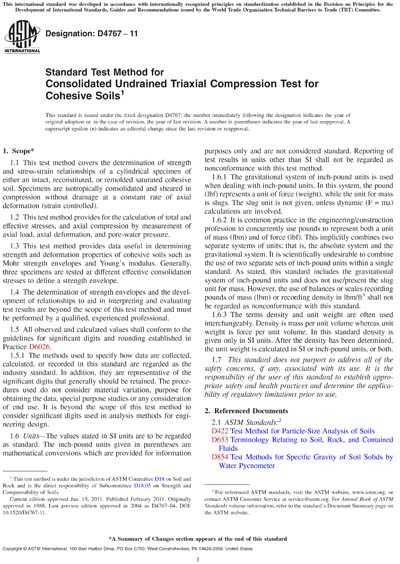Historical
ASTM D4767-11
Standard Test Method for Consolidated Undrained Triaxial Compression Test for Cohesive Soils
1.1 This test method covers the determination of strength and stress-strain relationships of a cylindrical specimen of either an intact, reconstituted, or remolded saturated cohesive soil. Specimens are isotropically consolidated and sheared in compression without drainage at a constant rate of axial deformation (strain controlled).
1.2 This test method provides for the calculation of total and effective stresses, and axial compression by measurement of axial load, axial deformation, and pore-water pressure.
1.3 This test method provides data useful in determining strength and deformation properties of cohesive soils such as Mohr strength envelopes and Young's modulus. Generally, three specimens are tested at different effective consolidation stresses to define a strength envelope.
1.4 The determination of strength envelopes and the development of relationships to aid in interpreting and evaluating test results are beyond the scope of this test method and must be performed by a qualified, experienced professional.
1.5 All observed and calculated values shall conform to the guidelines for significant digits and rounding established in Practice D6026.
1.5.1 The methods used to specify how data are collected, calculated, or recorded in this standard are regarded as the industry standard. In addition, they are representative of the significant digits that generally should be retained. The procedures used do not consider material variation, purpose for obtaining the data, special purpose studies or any consideration of end use. It is beyond the scope of this test method to consider significant digits used in analysis methods for engineering design.
1.6 Units—The values stated in SI units are to be regarded as standard. The inch-pound units given in parentheses are mathematical conversions which are provided for information purposes only and are not considered standard. Reporting of test results in units other than SI shall not be regarded as nonconformance with this test method.
1.6.1 The gravitational system of inch-pound units is used when dealing with inch-pound units. In this system, the pound (lbf) represents a unit of force (weight), while the unit for mass is slugs. The slug unit is not given, unless dynamic (F = ma) calculations are involved.
1.6.2 It is common practice in the engineering/construction profession to concurrently use pounds to represent both a unit of mass (lbm) and of force (lbf). This implicitly combines two separate systems of units; that is, the absolute system and the gravitational system. It is scientifically undesirable to combine the use of two separate sets of inch-pound units within a single standard. As stated, this standard includes the gravitational system of inch-pound units and does not use/present the slug unit for mass. However, the use of balances or scales recording pounds of mass (lbm) or recording density in lbm/ft3 shall not be regarded as nonconformance with this standard.
1.6.3 The terms density and unit weight are often used interchangeably. Density is mass per unit volume whereas unit weight is force per unit volume. In this standard density is given only in SI units. After the density has been determined, the unit weight is calculated in SI or inch-pound units, or both.
1.7 This standard does not purport to address all of the safety concerns, if any, associated with its use. It is the responsibility of the user of this standard to establish appropriate safety and health practices and determine the applicability of regulatory limitations prior to use.
Content Provider
ASTM International [astm]






